Blueprint for Canada is a major public policy experiment designed to give Canadians a voice. If you support the majority of positions taken on this platform please share our website with your social network both online and in real life. Most importantly, please consider emailing this website's address (www.blueprintforcanada.ca) to your elected representative and ask them to make the "Blueprint for Canada" K-12 education platform policies the standard for public education in your province or territory. Find your local Member of the Provincial Parliament (MPP), Member of the Legislative Assembly (MLA), or Member of the National Assembly (MNA) (Quebec) here. Add your voice today to those of tens of thousands of other parents, grandparents, legal guardians, and concerned citizens all across the country standing up for Canada.

As school board trustees we will
advocate for the following:
- We will advocate for the removal of all Diversity, Equity, and Inclusion training programs if they are deemed to be rooted in illiberal critical social justice based narratives.
- We will support Diversity, Equity, and Inclusion programs which teach unity rather than division. The "Theory of Enchantment", and the "Moral Courage College" are arguably representative of the gold standard in this area.
- We will advocate against the collection of student census data based on race, ethnicity, sexual orientation, gender identity, etc. on the basis that some of this information is private, and not appropriate to ask of a child, given the nature of the questions. Further, we oppose this increasingly common practice because the resultant data is typically falsely interpreted to promote claims that differences in outcomes between different groups are primarily due to systemic racism, sexism, homophobia, or other similar biases, without exploration of numerous other factors which contribute to differences in equal outcomes.
- We will defend the enforcement of disciplinary measures in schools in a way that is fair, consistent and thus predictable. Such measures are sometimes perceived as “wrong” because they might lead to different outcomes between identity groups. We believe that kids benefit from a structured, disciplined environment, and a child’s identity markers should not influence the way his or her errors or misbehaviours are handled. Parents... be assured we will take your children's safety at school seriously.
James Lindsay from New Discourses summarizes "Equity"
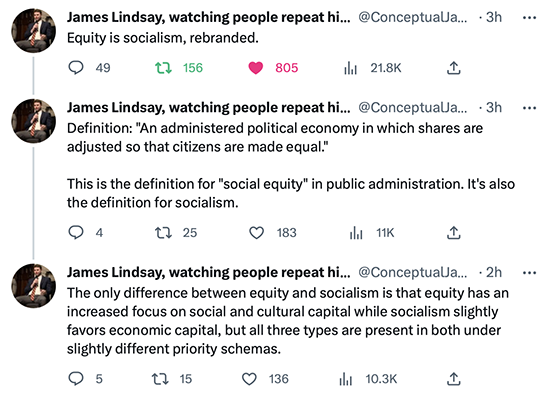
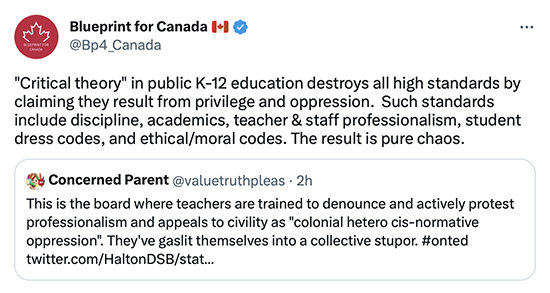
"More often than not, K-12 DEI efforts don't involve raising up those impacted by real racism and real academic gaps between the wealthy and everyone else; they instead drag everyone else down, canceling achievement benchmarks or eliminating standards altogether."@CDouglasLove3 pic.twitter.com/SE1XQF2hyW
— Free Black Thought (@FreeBlckThought) May 3, 2023

How CRT & equity initatives destroy schools and organizations.
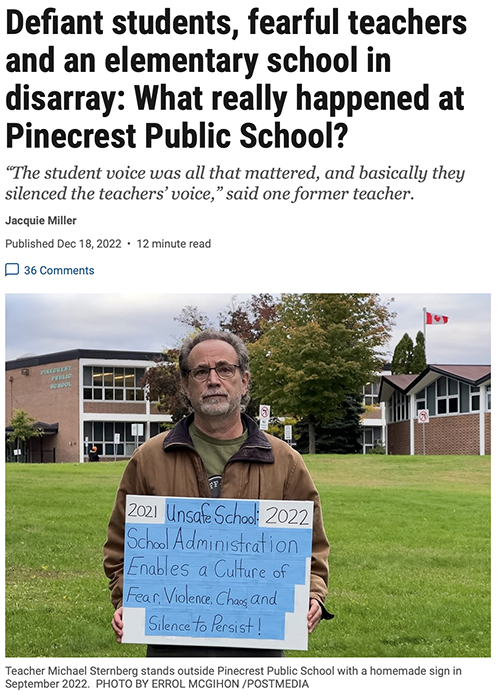
A case study of how equity and inclusion initiatives destroyed an Ottawa grade school leaving the institution ideologically paralyzed, violent, and dysfunctional.
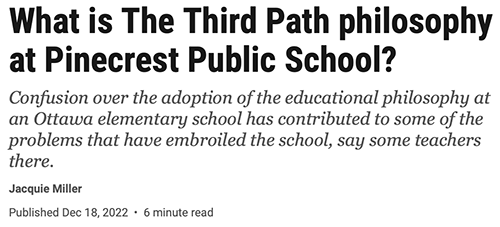
The Third Path - How a progressive woke based pedagogical education framework led to predicatable school chaos.
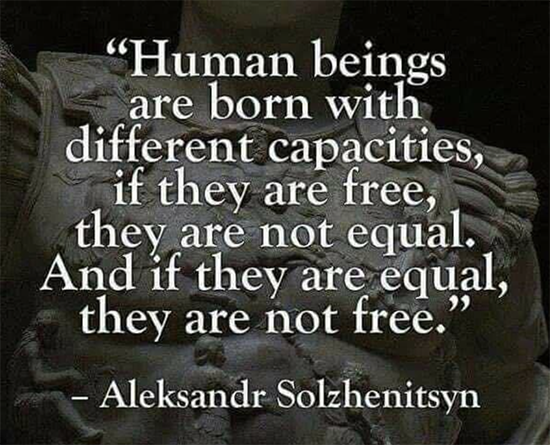
How "Equity" initiatives manifests themselves in the real world.
School boards and educational administrators must make reasonable efforts on matters within their control to support equality of opportunity for all students. Programs that provide a healthy breakfast and lunch for low-income students while in school or those which provide emergency assistance (gift cards for groceries or essential items) are an excellent example of such policies. However, in our view, school boards must strongly oppose efforts to ensure equality of outcome between students of different races, ethnicities, cultures, etc.
Unfortunately, the relentless pursuit of programs designed to facilitate equality of outcome in recent years has backfired badly within our public education system. Regardless of how well intentioned these efforts may have been, they have opened the door to a small industry of self-proclaimed “consultants” and “activists” whose true motivations are rather suspect given the often exorbitant speaking fees and/or social status they demand. These consultants claim highly questionable expertise in matters such as “Diversity, Equity, and Inclusion”, “Critical Race Theory” (CRT), “Gender Ideology”, and “Social Emotional Learning” to name a few. Much of this claimed expertise is based on highly dubious political/ideological narratives very much at odds with mainstream public opinion. These types of equity programs tend to trigger a never-ending feedback loop among school board trustees, staff, and teachers who feel coerced to indulge and fund continuous new “diversity initiatives” of questionable value in order to be deemed an “ally” of so-called “social justice” movements in the schools.
These equity efforts often manifest themselves in ways that do far more harm than good even for those students they were intended to help. The typical result of equity programs is a watering down of academic standards within the school district and the emergence over time of an increasingly dysfunctional and neurotic corporate culture both on school boards and in the schools themselves. The latter phenomenon is primarily due to the highly divisive underlying political “us vs them” narratives used to justify such efforts and the frequently coercive tactics used to promote them without allowing for any question or debate.
This type of training invariably leads to animosity, division, and ultimately hate. A strong case can be made that these programs do not reduce racism, sexism, or other biases but rather actively create them. Ultimately, these programs lead to a toxic corporate culture within “progressive” schools and organizations. The culture is characterized by pervasive infighting based on all manner of workplace grievances arising from notions such as “privilege”, “micro-aggressions”, and “oppression”. This toxicity then becomes an ongoing distraction to the primary goal of our education system which is to provide students with the key academic skills (reading, writing, mathematics, sciences, etc) for their adult lives.
As a school board trustees, we will push to cancel all existing contracts with 3rd party consulting firms that promote CRT based equity initiatives and will vote against further engagements with any such firms. We will only offer support for those efforts that seek to “lift all boats” by treating all staff and students as unique individuals and rejecting the divisiveness of programs focusing on “group identity”.
On a final note, we will not oppose any efforts at inclusion made in good faith which seek to recognize and celebrate traditional religious or cultural holidays for students of different faiths and ethnicities.







